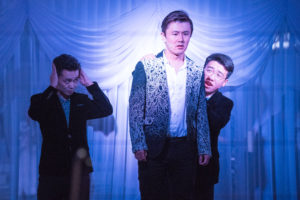
Q & A: Meili Li On His Experience Creating The Title Role In The Immersive Opera ‘Orfeo’
By Francisco SalazarWhen Meili Li completed his studies at the Royal Academy of Music, he became the first Chinese counter‐tenor to have received a conservatoire education.
Since completing his studies, Li has gone on to perform a wide range of repertoire that includes Renaissance lute songs and vocal ensemble music to 20th and 21st-century contemporary operas and songs. He has also become one of the countertenors to look out for as he has performed with such distinguished conductors, musicians, and directors as Sir John Elliot Gardiner, Laurence Cummings, Rachel Podger, Margaret Faultless, Lawrence Zazzo, Patricia Bardon, and Graham Vick and has gone on to perform at the Royal Opera House, Birmingham Opera, London Handel Festival, and Guildhall.
Now he is creating the title role in Fay Kueen Wang’s new immersive opera “Orfeo” and experiencing what a rock opera sounds like for the first time.
OperaWire had a chance to speak with the Countertenor about the new work and his return to China.
OperaWire: This work was written for a countertenor, a rare voice type here in China. Tell me what it feels like?
Meili Li: I think it’s really interesting that they wrote the lead role for a countertenor and I am the only Chinese countertenor working internationally and it’s not a big thing in China yet. Ten years ago there was no countertenor in China and no one knew about it. Now people have started to be aware of it and I am really glad they wrote the lead for my voice. It’s the same for Gluck’s opera, but I am really happy to explore this new work.
OW: What are the challenges of this new work?
ML: The difficulties are of course that Orfeo is really a very famous character and I am trying to capture the quality of the god of music. The countertenor’s voice suits it well that gives it an otherworldly quality which is slightly different. It’s neither really female or male and in many ways, it is a confusing voice.
For this work, we start at a wedding and we transition to hell and I find it difficult to use my voice to explore the differences. The biggest challenge, however, is that this is one with a band and there is rock music and a lot of new music. I have done new work but this is by far the most challenging. The musical style has a lot of different things and it is really interesting to get them all together. Plus we had quite a short period to put a new opera together.
OW: Tell me how you adjust for the immersive experience of this opera and how it affects the way you perform?
ML: It’s a challenge because we have to do a lot of moving around and we have to be aware of the audience. In a traditional opera you’re only facing one thing but here in a space like that we have to look elsewhere. You have to find the focus and I am on stage by myself as Orfeo sings 80 percent of the time.
On top of that, there is a camera always following you around so you can really see the facial expressions and features really clearly. It’s almost like a real scenario but at the same time, you are singing opera. If I were on a big stage I could be more exaggerated and you have an easier focus. You also have to take into account that there are people watching. It’s a funny conflict.
OW: Countertenors are known for baroque operas and some contemporary works. How did Fay Kueen Wang’s vocal writing fit into this voice type?
ML: Surprisingly it’s really good for my voice. I know she’s a great composer but the interesting part is that when many composers write music for countertenors it’s not always great. But with Fay, it is obvious that she thought about it a lot when writing the opera and how to use different colors. And I think if we were to do it more times, she would perfect it. Now it’s interesting and it’s suitable for my singing, especially because I have a good top.
OW: What is it like to world premiere a new work?
ML: It’s a great feeling because I’ve done several new operas and it’s quite interesting to explore new characters. But I usually treat older works and new works the same way. I always treat the works as if they are newly written because while I have references for older works, I imagine what I would do and I connect with my understanding of it so it can always be fresh.
OW: Tell me about your experience at the Beijing Music Festival?
ML: It’s my first time coming back to China to sing a major role in opera and I think this is one of the most prestigious festivals. I am really happy to do this here and it’s great to be among so many important people.
I remember when I was a student here in Beijing and I went to many shows at the festival. Now it’s interesting to be back and working in China. I am trying to enjoy the experience as much as possible.


